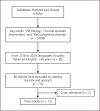Effects of Pet Therapy in Elderly Patients with Neurocognitive Disorders: A Brief Review
- PMID: 34703453
- PMCID: PMC8460886
- DOI: 10.1159/000518469
Effects of Pet Therapy in Elderly Patients with Neurocognitive Disorders: A Brief Review
Abstract
Introduction: Neurocognitive disorders (NCDs) are disturbances highly related to age. This means that, with the increasing trend in life expectancy, there is also an increase in this diagnosis, although NCDs are not exclusively found in the population over 65 years old. Likely, they will increase in the coming years together with improvements in diagnosis. In addition to the use of medicines and rehabilitative techniques, pet therapy is also used. Pet therapy makes use of animals with therapeutic, rehabilitative, educational, and recreational purposes for people affected by physical, neuromotor, and psychiatric disorders. Pet therapy seems to be functional for increasing social and communication competencies, facilitating verbal and body language, increasing self-esteem, improving quality of life, and reducing anxiety/stress.
Methods: This study was based on scientific papers and publications obtained from the PubMed and Google Scholar databases. Moreover, other articles from further cross-references were included. Specific database research criteria were (a) articles published in 2018 or later, (b) samples containing only adults over 65 years old, (c) written in English or Italian, and (d) on the topic of animal-assisted intervention.
Results: Uncertain results were obtained. Although a positive effect was found, the included articles were of insufficient methodological rigor.
Discussion/conclusion: Although many studies reported positive results, these could not be generalized because of the numerous biases present (e.g., small sample size, lack of methodological rigor, lack of protocol, etc.). Future studies, therefore, should seek to address the limitations found in the analyzed studies.
Keywords: Alzheimer; Anima-assisted intervention; Geriatric; Neurocognitive disorder; Pet therapy.
Copyright © 2021 by S. Karger AG, Basel.
Conflict of interest statement
The authors declare that they have no conflict of interest.
Figures
References
-
- Kring A, Conti D, Johnson S, Davison G, Neale J. Psicologia clinica. Bologna: Zanichelli; 2017.
-
- National Academy on an Aging Society Challenges for the 21st century: chronic and disabling conditions. 1999. Retrieved from: http://www.agingsociety.org/agingsociety/publications/chronic/index.html.
-
- American Psychiatric Association Diagnostic and statistical manual of mental disorders. 2013.
-
- Pierri G, Viola M. Incidenza della demenza in Italia. Rivista di psichiatria. 2003;38:6.
-
- World Health Organization . Factsheet. Geneva: World Health Organization; Dementia. [updated 2017 Dec]. Available from: www.who.int/news-room/fact-sheets/detail/dementia.
Publication types
LinkOut - more resources
Full Text Sources



